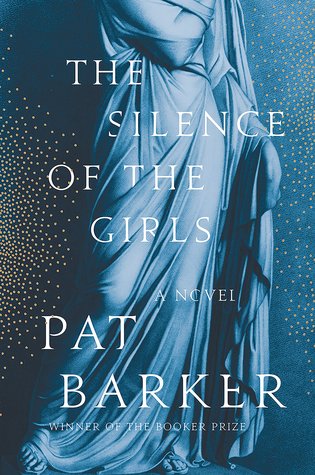
Man, people are getting all up in this book's face because it doesn't read like Madeline Miller. Of course it doesn't read like Madeline Miller. Do you see the name Madeline Miller on the cover? No; it says "Pat Barker." It's like marching up to your step-mom and saying, "YOU'RE NOT MY REAL MOM." Well, duh. But that doesn't necessarily mean that she's a bad person, either.
THE SILENCE OF THE GIRLS appeared on Netgalley one fine summer day, and I did what I do with all ARCs: applied for it, and then promptly forgot about it until it was about to expire. When I saw that it was about Ancient Greece, however, I immediately prioritized it a little higher on my to-read list, because I love learning about antiquity. Ancient Rome, Ancient Egypt, Ancient Greece - that sort of thing is my jazz. I could listen to it all day.
I actually read this book at the perfect time because I had just finished another book called A THOUSAND SHIPS, which is about the events in The Iliad that lead up to the Trojan War. In THE SILENCE OF THE GIRLS, everyone is already in the thick of it, and things are nearing the end. The narrator is Briseis, a casualty of the Trojan war, who ends up becoming a war prize/concubine of Achilles after watching everyone in her home be slaughtered or raped depending on their gender. She is also part of the dispute between Agamemnon and Achilles, which ends up resulting in the turning point of the war, AKA When Achilles Loses His Sh*t™.
Most of the story is narrated by Briseis, but some of it is also narrated by Achilles. I wasn't really interested in his narrative, because he was a Sad Boy with Mommy Issues™ who Freud would have a serious field day with (seriously, the "sex" scenes in this book were wtf). It is not a book for the faint of heart. The author really does not shirk on the physical and sexual violence. As William Tecumseh Sherman said, "War is hell." But it's especially hell for women, who are basically considered chattel as far as the men in this book are considered, and whether they're being sacrificed on a pyre, spat on, abused, assaulted, or treated with the most condescending sort of compassion possible, they are still considered objects - objects resented, cherished, despised, coveted, but objects all the same.
I remember reading somewhere recently that Greek heroes aren't really the same as American heroes, in that many of them were not Good People. They did awful things (see Hercules/Herakles) in the name of glory. Many of them would probably be closer to villains, now that I think about it, who are far more consumed by vainglory than our (almost self-abnegating) selfless heroes. Actually, now that I'm thinking about it, I remember exactly where I heard that quote: it was in Lindsey Ellis's review of Disney's Hercules (a must-watch; she really has the most excellent feminist/cinematographic rhetoric). And I think she has a good point. Achilles, too, is awful. Pat Barker lays that out clearly.
Barker also makes the odd choice of writing this book with modern language. Margaret Atwood did that too with the PENELOPIAD, but that feels like more of a post-mortem retrospective, whereas this takes place in Ancient Greece - and yet, they're talking like a bunch of modern British people. What gives with that? I saw that a lot of people who were criticizing this book took issue with that (yes, the Madeline Miller people, mostly) and I'm more sympathetic to this; the Greek myths were lyrical and dramatic, and its odd to have that sort of storytelling removed from the equation: odd and jarring.
That said, I did enjoy this book. Parts of it were slow (Achilles) and it was unpleasant to read (horrific scenes), and told in an odd way, but the modern language also makes it easier to understand what's going on. I would not read this in lieu of The Iliad, but it makes for a nice supplement.
Thanks to Netgalley/the publisher for the review copy!
3 out of 5 stars
No comments:
Post a Comment
Note: Only a member of this blog may post a comment.